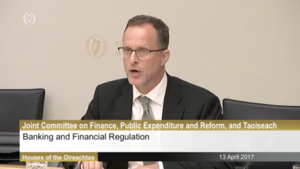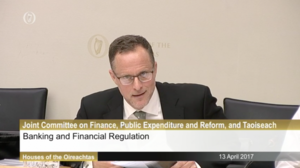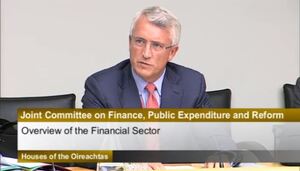
Jonathan Sugarman
This morning.
At the Joint Committee on Finance, Public Expenditure and Reform, and Taoiseach.
Jonathan Sugarman just gave a thundering opening statement to the committee.
Mr Sugarman is a former executive at Unicredit Bank Ireland in Dublin’s IFSC who resigned in September 2007 after giving a detailed account of enormous liquidity breaches at his bank a year before the financial crash.
More to follow.
Watch live here
UPDATE:
In his opening statement, Mr Sugarman said:
“Good morning, Mr Chairman, members of the committee, ladies and gentlemen, thank you for giving me this opportunity to, finally, put on record some of the factors which contributed to the Irish banking crisis and how I believe these can be avoided in the future.
For those of you who do not know me, my name is Jonathan Sugarman and I was the risk manager for Unicredit Bank Ireland, a bank of roughly €30billion balance sheet which was located in the Irish Financial Services Centre (IFSC) in Dublin 1.
I joined the bank in May of 2007. For those unfamiliar with the term ‘risk manager’, it is like a policeman who works within a bank on behalf of the banking regulator which, in this case, was the Central Bank of Ireland. So, effectively, I was there to look out for the people of Ireland.
My job, and that of all risk managers in all banks, regardless of where they are located, is to ensure that the regulations, regarding how a bank is run adhered to and upheld. If they are not, it is my duty, not just to my employer but also to the regulator, to inform them of any activities which may not be within the limit of the regulations under which the bank operates.
In 2007, the regulations under which I operated, Unicredit Bank Ireland, were unambiguous and very clear, as were the penalties for any infringement which might occur. In my case, failure to immediately notify the Central Bank, of a breach of these regulations, could result in a mandatory fine and/or five years in jail.
It is against this backdrop that I wish to talk to you today. I spent the first couple of months at the bank, in 2007, familiarising myself with the systems, products and internal control mechanisms. Having previously worked for two German-owned banks in Dublin, I was well familiar with the risk management practices and the regulations which govern them but, approximately two months into my tenure at Unicredit, I began to notice anomalies which were irregular but happened with a frequency which suggested to me that they urgently required further investigation.
Within a very short space of time, it became commonplace for me to have daily meetings with the chief executive officer of the bank to discuss the ever increasing number of breaches of regulation which I was observing. I was told not to worry; that these were simply IT-related glitches and that there was nothing for me to worry about.
I thought this was somewhat unusual, as, being a risk manager, I would personally, suffer the full weight of the law if it were proved that I was aware of such breaches of regulations and did not report them to the Central Bank.
Needless to say, as a new employee, in a new bank, I went along with the instructions of my CEO for another week or two but there was no effort whatsoever being made to prevent or investigate the real cause of these glitches.
It must be borne in mind that the relative liquidity regulations came into force on the 1st of July, 2007 which is two months after I started working at Unicredit and I was only too well aware of the penalties for not complying.
I now refer you to item six which I’ve provided you with. The requirements for the management for liquidity risk, as were issued by the financial regulator, as he was called then, in 2006, to be enforced in 2007. This is item six, I refer you to page 24. The extract below details the penalties applicable for any breach of regulations which took place after the 1st of July, 2007.
And I quote, this is from Irish law: In particular, section 58 of the Central Bank Act of 1971, which refers to offences and punishments, as amended by the substitution of Section 9 of the Central Bank Act of 1989 states that a holder of a licence, a banking licence, who commits, by act of omission a breach of condition duly imposed and which relates to the licence, shall be guilty of an offence and shall be liable 1) on summary conviction to a fine not exceeding a thousand Irish pounds or, at the discretion of the court, imprisonment for a term not exceeding 12 months, or to both. Or 2) on conviction, an indictment to a fine not exceeding 50 thousand Irish pounds, or at the discretion of the court, to imprisonment for a term not exceeding five years, or to both.
Further down the page, you can read, if the contravention breach or failure, in respect of which he was convicted, is continued after the conviction, he shall be guilty of an offence on every day, on which the contravention, breach or failure continues after conviction, i.e. every breach was a criminal act. Every single breach was a criminal act.
Further down, section 60 of 1971 Act contains an extension of the offending provisions. This states: Were an offence under this act is committed by a body corporate, or by a person perpetrating, purporting to act on behalf of a body corporate, or an unincorporated body person and has been proved to be so committed with the consent or the approval of, or to have been facilitated by any wilful neglect on the behalf of any director, manager, secretary, member of committee or the controlling authority of such a body, or official of such a body, such persons shall also be guilty of the offence which means not only am I guilty, my regulator is equally guilty – once I’ve notified him.
There is no dispute of the fact I reported that the 20% liquidity breach to the Central Bank in the late summer of 2007 and I urge you to understand the significance of such a breach, and the following explanations should make it relatively easy to understand.
Regulation states that a breach of 1% should send alarm bells ringing and red lights flashing. The Central Bank must be notified immediately.
In the context of driving a car, this would mean that there is a speed limit of 100kph. Driving a 101kph is a breach of law that has to be reported immediately to the authorities. Unicredit Bank Ireland only bothered to oblige the law and notify the regulator when we were speeding at 120kph.
The immediate question that should have been raised by the regulator as soon as I notified them of this should have been: how on Earth did you get to liquidity at 20%, a 20% liquidity breach? Were you not aware when you exceeded 5%? Or 10%? Where were you when you hit 15%?
A breach of 20% implies that the bank came perilously short of liquid assets. The most liquid asset is cash. The events at Unicredit at the summer of 2007 occurred against a backdrop of the first bank run that Europe had seen since World War Two. The entire branch network of Northern Rock, in the United Kingdom, had thousands of customers queuing at the door in fear that the bank was unable to return the cash that they deposited with it.
In the meantime, the management systems at Unicredit Ireland were showing serious shortages of liquidity on a regular basis.
So gentlemen, ladies, as you can see for the above section of bank regulations, that it would not just be me, as the risk manager who would be liable for prosecution but, also, the CEO of Unicredit and more importantly, and I cannot stress this highly enough, any other controlling authority which in this case was and still is the Central Bank of Ireland.
What I find absolutely incredulous is that my life has been utterly destroyed, simply because I did the right thing.
But the people who are jointly liable for the failure to adhere to the regulations, which this house formulated, and passed into law, got off absolutely scott-free.
There were no sanctions whatsoever placed on Unicredit or, more importantly, the Central Bank of Ireland. I remind the committee that I have been unable to work for over 10 years and I am totally unemployable as a result of my upholding the law of the Republic of Ireland.
Had the regulator done its job, it is my contention that the liabilities, which were placed on the shoulders of the Irish nation, specifically, the blanket guarantee which was given to all Irish banks overnight which was effectively a blank cheque underwritten by every citizen in this state would not have been necessary. And this happened just a year after I resigned over the same issue of liquidity.
A year after this, the country was saddled with a €64billion debt incurred by the banks who violated liquidity regulation which I had, the same regulation, which I had tried to warn the regulator about a year before.
At the very heart of this matter, is that neither parent company in Italy, nor the Italian Central Bank knew anything about this breach of regulation until 2010 that is three years later as can be observed in the video clip provided for you in item 14 in which Mario Draghi, president of the European Central Bank, recently states this unequivocally.
The Central Bank of Ireland should have notified both of them immediately. And here we are, ten years later, and Mr Draghi says, ‘I’ve never heard of this’. Said so directly to MEP [Luke Ming] Flanagan sitting right here today.
The question now must be asked how is it that the Central Bank was remiss in carrying out its statutory function and nobody has been officially sanctioned because of it.
My life was destroyed but the life of those who work and worked in the Central Bank were not. You, the committee, must ask why and only you can ask why and get the answers.
In the recent Banking Inquiry with which this very committee and four members of this committee in particular are more than familiar, another whistleblower emerged. The particular investigation in which they were involved was the regulatory stream.
The Banking Inquiry whistleblower made it very clear to members of the joint committee of inquiry into the banking crisis that they were of the opinion that Central Bank of Ireland was being deliberately obstructive in regard to the investigation and it was alleged that the Central Bank withheld certain documentation. This was later corroborated by a former employee of the Central Bank of Ireland.
I am aware that the Banking Inquiry whistleblower made several attempts to ensure that I would give the evidence to the joint committee then. I fail to understand why my attendance was prohibited at that time, while the members of the committee were aware of my case and it’s taken you this long to invite me in here today.
To conclude, Mr Chairman, there are a number of threads of commonality which run through all of the banking systems in this country. And that is certainly the delay between matters of potential or actual financial malfeasance being reported and the time it takes for Official Ireland to admit that it just may have an issue that must be dealt with.
The harsh fact of the matter is that Official Ireland has absolutely and completely destroyed the lives of every single whistleblower who has come forward, regardless from which organ of the State.
It took Maurice McCabe 10 years of battling against the State, to finally begin repairing his life because the State made it as hard as possible for him and his family.
The same goes for John Wilson and how he was treated.
We should mention the Mary Boyle case and, more recently, the cover-up of the Grace scandal.
The problem with this country is Official Ireland those civil and public servants, at the very top levels, the ones who have their hands on the levers of power from any form of sanction while those who do the right thing are vilified and their lives destroyed.
And, finally, the reason there is such a row about getting people to pay for water, or people lying on trollies is because, at the end of the day, the banks and their highly paid executives have always got to be paid.
And it will always be the poor people of Ireland who will suffer the most. Unless this House has finally got the guts to do what is right.
Which is why I’m in shock that items I submitted for you all to see last Monday, by 10 o clock, I had to wait until yesterday, an hour before the close of business, to be told that I had to redact them [including correspondence from the Central Bank]…I wish to thank you and at this stage I would be very happy to answer questions that you may have.”








